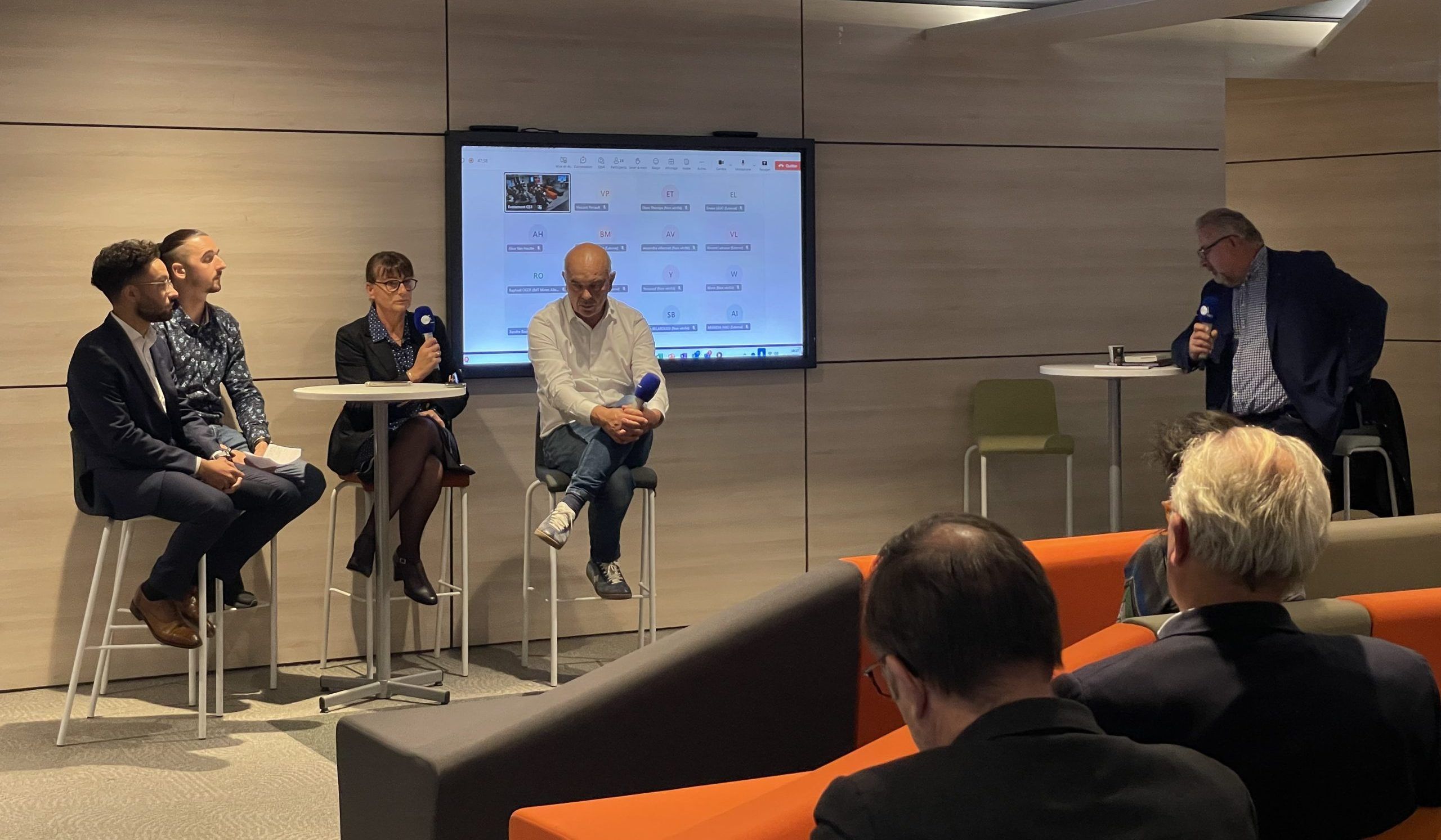
A career in Supply Chain: is BAC +5 the key?
To mark the launch of the 3rd edition of our "Guide des formations supérieures en Supply Chain", students, parents and professionals came together on September 23 for an evening dedicated to one question: is a 5-year degree the key to a career in Supply Chain?
Behind this question lies the whole relationship between qualifications, skills and developments in the sector, which was debated by our speakers with varied and inspiring backgrounds.
How it all began
" The range of Supply Chain training courses continues to develop and evolve. How can we find our way through this profusion? How can we help young people identify the training that best suits them?
After the first 2 editions, France Supply Chain worked for a year, with the help of an apprentice, Houlda WOROU, to gather all the necessary information and prepare a3rd edition, which we wanted to be entirely digital to make it easier to update and consult.

It's a major undertaking, and we hope it will prove a useful tool for everyone. Loïc LASSAGNE -HR General manager - Supply Chain at Renault Group & Leader of LAB Richesses Humaines.
A career in supply chain: training is still essential
At a time when the supply chain sector is booming, it is still too little known to the younger generation. Our guide is designed to help them make the right choices.
- More than 200 listed training courses, including 30 new ones, covering the whole of France.
- A 100% digital format, interactive and updated in real time, to keep pace with developments in the sector.
- Greater accessibility: students, professionals undergoing retraining and companies will all find solutions tailored to their needs.
It is aimed at 3 main audiences:
- Students looking for training, and possibly their parents or financial sponsors.
- Companies looking for young or not-so-young supply chain talent.
- To training institutes and organizations that can showcase their courses while looking at what's being done elsewhere.
All roads lead to Rome...or to the Supply Chain
Throughout the evening, our speakers reminded us that there is no single standard route into the supply chain professions. A wide variety of career paths are possible, from Bac+2 to Bac+5, not forgetting continuing education for working professionals.
The proof is in the pictures:

Today's Supply Chain is enriched by multiple trajectories, and our speakers have clearly understood this. From schema to reality, their backgrounds and advice give you an overview:

Vincent Barale, Vice President Supply Chain at Louis Vuitton
- University career
- His position as logistics manager at Carrefour took him as far as Hong Kong
- Executive at Louis Vuitton for 22 years
"If you have a 5-year higher education diploma or an engineering degree, it's to move up the hierarchy and take up a management position. In a management position, you're going to be asked to have a global view, to be able to draw up a strategic plan, to make structuring choices for the company, sometimes heavy investments, and so on. But to be credible at this level, you need to be close to the field. An engineer who stays behind his screens won't get very far.
On the other hand, if you've just graduated from a BTS or IUT, you already know the terrain. You need to educate yourself. Go to exhibitions, go to the cinema, read books, but get out of the field, otherwise you'll be seen as mega-operational".

Rodrigue Branchet-Fauvet, E2E Supply Graduate Program at Renault Group
- University career
- Completed two Master's degrees: one at university, the other at a business school to specialize in Supply Chain
- Has had the opportunity to go abroad through internships and international exchanges
- Now working for Renault Group
"When I did my first Master's, I decided to do a second one to specialize and understand what Supply Chain was, and not go straight into the world of work lost and without a global vision because at first I summed it up as trucks and pallet trucks, but it's not that at all.
This second master's degree gave me this more global vision, but I lacked the professional experience that I hadn't gained in my university career, where I had taken advantage of internships abroad and international exchanges."

Baptiste Coccia, Inventory management and logistics project manager on a work-study program at CNR (Compagnie Nationale du Rhône).
- BTS in international trade
- A year in New Zealand to learn English
- 8 years in transport and logistics
- Travelled in Asia and Australia
- Has resumed her studies and has just started her Master's degree in Lyon on a sandwich course.
"My aim in going back to school and taking this Master's degree is to acquire all the skills I didn't necessarily have, since I was really specialized in sea and air transport.
So now I'm involved in logistics and stock management, and in parallel with my Master's degree, I'm specializing in purchasing, which will give mea real diversity of skills, and I think these are profiles that are in demand on the job market, particularly in the supply chain. What's more, this Master's degree is recognized internationally , so it will be easier for me to apply for jobs abroad."

Laurence Papeil, Supply Chain Director at RAJA
- Worked 10 years after BTS
- Returned to school at 32 with three young children to "tick the bac+5 box".
- Master International Logistics and Transport
- This determination led her to Energizer's world headquarters in the USA as Global Logistics and Distribution Director.
"You can't systematically start out with a Bac +5, but it's more afterwards, how you manage all the opportunities you may have and I think that's what's important, it's to make structuring choices, good ones, sometimes bad ones too, but the important thing is to bounce back, and really move forward regardless of whether or not you have a level of study that corresponds to the position you're given."
The last word
Throughout the round table, they reminded us that there is no linear path to success in the world of Supply Chain. So, yes, studying at a grande école and doing long studies will always be valued, but experience is a social springboard for climbing the ladder. You can start at the bottom of the ladder and quickly build up your skills and responsibilities.
Today, many choose the academic route. The real question then becomes: how do you stand out from the crowd? Here's a roundup of advice from our speakers:
- Get out in the field: experience the plant and warehouse to understand operational reality and prepare for the move to management.
- Broaden your culture: nurture your strategic vision beyond technical expertise.
- Make the most of your differences: open up to the world, learn English and more, develop your interpersonal skills.
- Project yourself 20 years from now: define a long-term career vision and ask yourself whether the path you've taken is still in line with your desires.
- Dare: remain curious, test, take risks.
- Maintain your network: prolong exchanges and networking.
Spread the word

